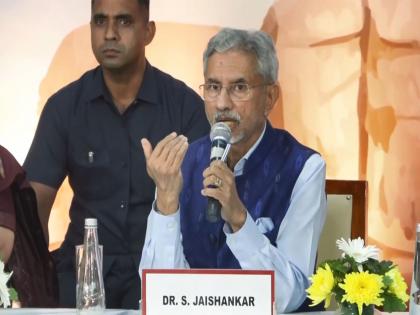India's 'strategic autonomy' key to safeguarding national interest: Jaishankar at Aravalli Summit 2025
By ANI | Updated: October 7, 2025 03:35 IST2025-10-07T03:31:26+5:302025-10-07T03:35:04+5:30
New Delhi [India], October 7 : External Affairs Minister S Jaishankar on Monday addressed the inaugural Aravalli Summit 2025 ...

India's 'strategic autonomy' key to safeguarding national interest: Jaishankar at Aravalli Summit 2025
New Delhi [India], October 7 : External Affairs Minister S Jaishankar on Monday addressed the inaugural Aravalli Summit 2025 at Jawaharlal Nehru University (JNU), marking the 70th anniversary of the School of International Studies (SIS).
At the event, Jaishankar said, "We do try to accommodate neighbours. We can accommodate them to the extent our national interest allows."
Emphasising the importance of independent decision-making in global affairs, he added, "Imagine, if today, you were not adopting strategic autonomy. Please tell me which country you would like to join up with and put our future in their hands. I can't think of anybody... To me, my interest is best secured by maximising my opportunities and maintaining my freedom of choice."
The two-day international conference, themed 'India and the World Order: Preparing for 2047', is being held on October 6 and 7 in New Delhi.
Organised in collaboration with the Ministry of External Affairs and the Chintan Research Foundation, the summit focuses on India's evolving global role as it approaches its centenary of Independence.
Addressing the question of regional dynamics, Jaishankar noted that India has multiple neighbours, some "clearly better than others," and observed that "hyphenation happens with a neighbour who is not so nice."
He added that the best way of de-hyphenation is to outstrip the other party in terms of "power and capability."
Without directly naming Pakistan, Jaishankar said India cannot wish away a difficult neighbour, "however unpleasant it may be," while indicating that other countries no longer draw an equivalence between India and Pakistan as was often heard in the seventies.
"The first question about hyphenation. We have multiple neighbours. Some are clearly better than others. And the hyphenation normally happens with a neighbour who is not so nice," he said.
"Now, you have to understand when we say de-hyphenation, that means it's our objective and our approach that decisions made by third countries about us are not made keeping that relationship as the lens or as the factor of calculation or factor of primary calculation. Now, that doesn't necessarily mean that they would accommodate us," he added.
Explaining the competitive nature of international politics, Jaishankar said, "I think you will always see attempts, you know, to balance us off or to, if there is a situation, to use that situation for their own ends. That is the competitive nature of international politics."
"From our perspective, you know, the best way of de-hyphenation is frankly to outstrip the other party in terms of power and capability," he said.
Recounting his experience as a diplomat, Jaishankar added, "And today, you know, I can tell you as a person who travels, meets people, I've just come from a UN session. The kind of equivalence that I would hear when I joined the Foreign Service, when I left JNU and entered the Foreign Service in the 1970s, Ambassador (Kanwal) Sibal would vouch for a decade before that. Nobody talks like that anymore."
"So, I cannot wish away a difficult neighbour. I mean, that is a reality, however unpleasant it may be," he said.
Disclaimer: This post has been auto-published from an agency feed without any modifications to the text and has not been reviewed by an editor
Open in app